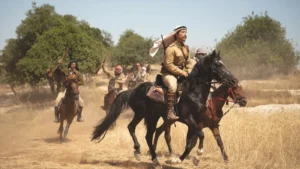Palestine 36: Annemarie Jacir’s epic is a lesson in anti-Hollywood history

A shot from the film Palestine 36, depicting rebels on horseback
Joe Gill writes in Middle East Eye on 12 November 2025:
As far back as Julius Caesar’s Conquest of Gaul, imperial chiefs wrote their own history, painting themselves in a sympathetic light, and their victims as hapless losers, or terrorists.
The weapons of erasure that colonialism and imperialism inflict on dispossessed populations and cultures are multifold and far reaching. History is told by the victors, or as Churchill put it, “History will be kind to me for I intend to write it.”
The physical, political dispossession of territory, self-determination and the basic rights to life and freedom are overlaid by other forms of erasure – in the realm of official history, news, and in entertainment. Edward Said eloquently explained this half a century ago.
For this reason, the power of representation of the oppressed, racialised and colonised in drama – TV and film especially – cannot be underestimated.
In the age of Hollywood, films are the most popular form of mass storytelling, and not surprisingly, the ruling powers tell their story in a way that suits the ruling class. From Zulu to The Crown, British filmmakers and dramatists have told the story of the empire with its soldiers and royalty as the protagonists, making us care about them. Ordinary people and the colonised are mostly walk-on parts, and the sympathy and investment of the audience is always limited by the focus of the script on the rulers’ and colonialists’ lives.
In recent times, social media has broken the monopoly on elite storytelling by allowing ordinary people to tell their own stories and potentially reach millions: the Gaza genocide and the videoing of it by its victims is the most stark example. Without doubt, this capacity to centre the victims of empire and make them the protagonists has a shattering impact on the capacity of colonial powers the US, Israel and Britain to narrate Gaza as an antiterrorist campaign, rather than a genocide.
Breaking the narrative: Palestine 36
In the realm of cinema, who tells the story is still dominated by the imperatives of Hollywood executives, with small independent producers occasionally breaking the narrative mould by centring the stories and lives of those on the margins of wealth, power and elite representation.
Hollywood auteurs have at times dabbled in stories of rebellion and resistance, whether in fantasy, science fiction, or more realist outings, such as the recent One Battle After Another by director Paul Thomas Anderson, starring Leonardo DiCaprio as a hapless urban guerilla. But even this film, which begins with an exciting premise of organised direct action to free detained migrants, becomes another entertaining Hollywood tale that fetishises action over ideas.
Enter Annemarie Jacir’s Palestine 36. I don’t think it can be overstated how incendiary and powerful her film’s arrival is for the simple fact that the Palestinian story has never been given a large-budget, ambitious historical telling (for western audiences) on the big screen until now.
The Palestinian story has been systematically silenced, distorted, or deployed under the empire-centric frame of terrorism – against decent, sympathetic westerners or Israelis. While there have been a number of commendable independent efforts in recent years to tell the Palestinian story, Jacir’s film is unique in ambition, directorial intention and historic sweep.
